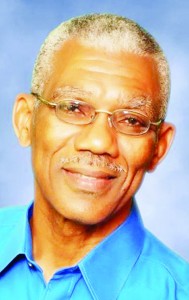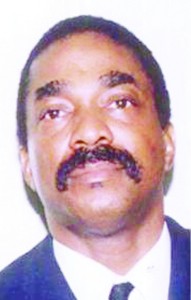
David Granger
The Full Court on Monday granted Opposition Leader David Granger leave to move to the Appellate Court to seek redress for a decision it made earlier this year to exclude him from the just-completed 2012 budget cuts case.
Should Granger succeed in his appeal, it would create a whole new dimension of the issue, with the budget just around the corner and the opposition intent on cutting the estimates.
In a statement, the A Partnership for National Unity (APNU) said on January 22, the opposition leader’s attorney, Basil Williams, filed an application for leave to move to the Court of Appeal after the Full Court ruled that it had no jurisdiction in the matter of the striking out of Granger as a defendant by acting Chief Justice Ian Chang in the budget cut case.
On Monday, the matter came up before Justice James Bovell-Drakes and Justice Rishi Persaud, APNU said, and after a short hearing, leave was granted for an appeal to the Appellate Court.
The Full Court on January 13 had ruled that it did not have jurisdiction over whether or not Granger should be excluded from the case dealing with whether the opposition had the right to cut the 2012 national budget. It, therefore, said that Chang’s ruling stood.

In a brief ruling, Justices Bovell-Drakes and Persaud noted that the Full Court had said it did not have the jurisdiction to overrule or go against a decision handed down by the acting chief justice. The two judges had presided over the Full Court hearing of an appeal filed by Granger, challenging the ruling of Justice Chang. Justice Chang, on June 18 last, ruled that Granger and Finance Minister, Dr Ashni Singh will be barred from the 2012 budget cuts case.
The two judges’ ruling had concurred with initial contentions expressed by Attorney General Anil Nandlall that the appeal was ill-conceived.
Nandlall said that the order made by the acting chief justice was final and brought all matters of contention to an end between the attorney general and the two defendants in the High Court.
Contentious
He explained that the law states that when a final order is made by a High Court judge, the next court to approach is the Court of Appeal; however, the opposition appealed to the Full Court.
As such, he noted that his first submission was for the Full Court to satisfy itself whether it has jurisdiction over the decision of the acting chief justice.
Granger had pointed to his exclusion from the case as one of the unresolved issues following Chang’s recent ruling that the opposition cannot cut the budget.
He said back then that having struck him out as a defendant in the case without giving him a hearing, the acting chief justice refused to let the law take its course in the appellate courts, and rushed to finish the case before the ruling of the Full Court on his application for leave to appeal its decision to the Court of Appeal.
Speaker of the National Assembly, Raphael Trotman has already said that Chang’s ruling has far-reaching implications for the Commonwealth parliamentary system, arguing that the National Assembly’s capacity to approve as well as amend budgetary estimates is a long-established right.
Trotman said the ruling of the acting chief justice provides an interpretation of the rules and standing orders of the National Assembly relative to their conformity with the Constitution of Guyana. He argued that Article 171 of the Guyana Constitution is the same as those provisions in the constitutions of all Commonwealth nations as the standing orders and rules of the parliaments of Commonwealth nations.



